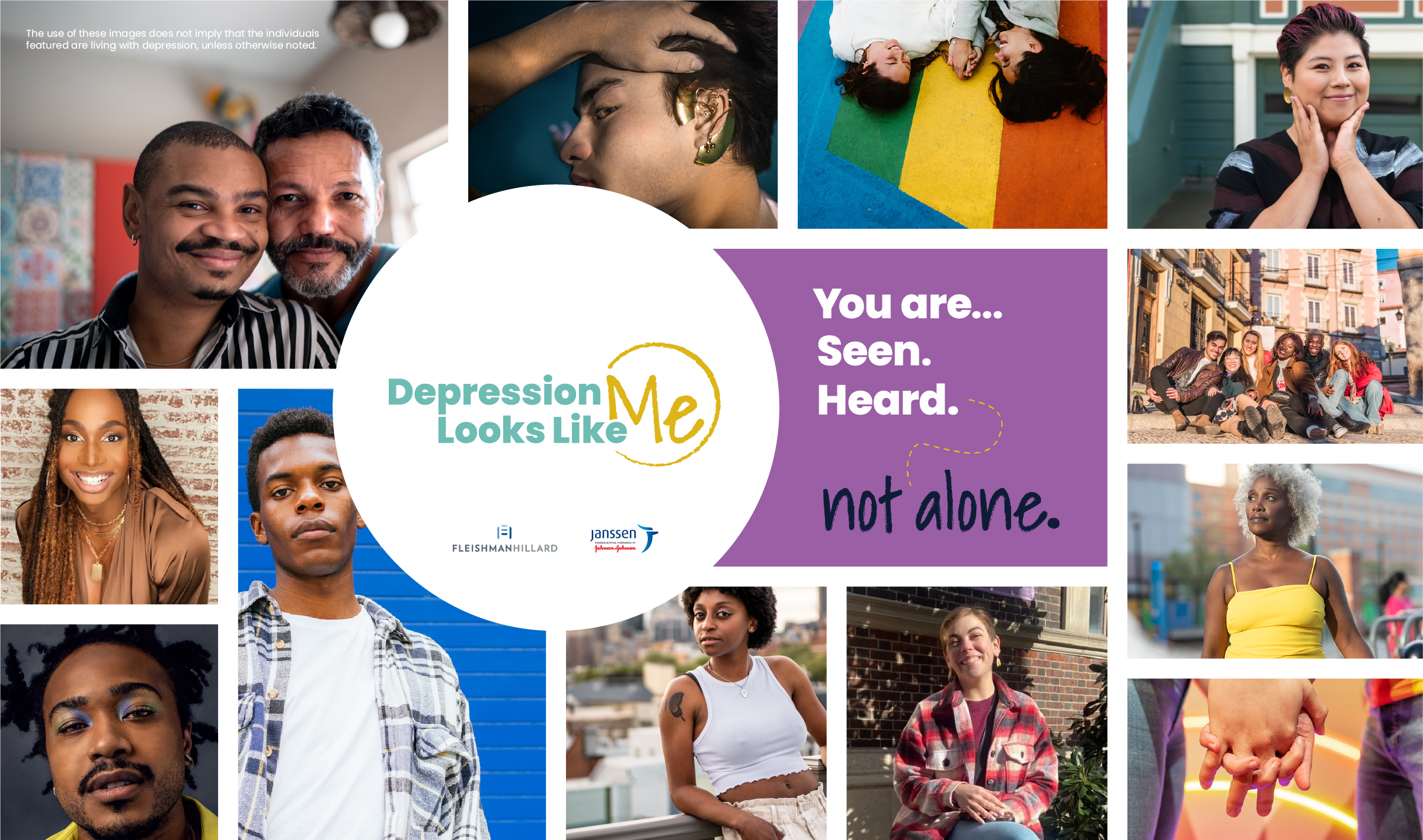
We are in a crisis. Today, 21 million American adults have major depression. Its differing symptoms and experiences are unique to everyone, making it difficult not only to live with, but also to talk about.
The LGBTQ+ community is among the most impacted. One in three of the estimated 10-32M LGBTQ+ adults experience mental illness – 50% higher than heterosexual adults – with greater rates of depression and suicidality than non-LGBTQ+. And while the community is open to talking about depression, many can’t name their disease and are unsure where to turn for help.
It was clear that relevant resources to provide education about the different facets of depression and inspire the community to understand treatment options were necessary. Most importantly, we needed to show depression’s complexity through the eyes and the experiences of the very people we were trying to reach to make an impact.
We challenged ourselves to create a campaign built with the LGBTQ+ community’s diverse lived experiences front and center to:
Generate coverage, conversation and engagement about the impact of depression among LGBTQ+ adults
Drive traffic to our website with resources and information about different types of depression
Build trust and equity among the community and its allies
To effectively support this community, we aimed to meet them where they were and guide them to a safe, trusted space to learn more.
Our research reinforced a digitally-focused campaign as the right approach, leveraging trusted voices and influential partners to drive LGBTQ+ people living with depression to culturally relevant and competent resources, providing information about hard-to-treat depression and access to LGBTQ+ friendly healthcare professionals. This would help our intended audiences finally see themselves represented in their condition. And from that, Depression Looks Like Me was born.
With the understanding that representation in mental health discussions is vital to drive change, we partnered with leading mental health and LGBTQ+ groups – National Coalition for LGBTQ Health, Mental Health America (MHA), SAGE, National Alliance on Mental Illness (NAMI), The TransLatin@ Coalition and Black Emotional and Mental Health Collective (BEAM) – to ensure we had an array of resources across different intersections leading to culturally relevant care.
To build equity and trust, we knew collaboration with influencers, specifically those who could accurately reflect the depression experience, was crucial. We focused on partnering with members of the LGBTQ+ depression community to develop a robust influencer program.
These elements working together would enable us to reach our very specific intended audience in authentic and relevant ways to broaden the aperture so the LGBTQ+ community could see themselves managing a life with depression.
Depression Looks Like Me, a brand-supportive, integrated campaign, launched on May 18, 2022, to help the LGBTQ+ community finally see themselves represented in the struggle when living with depression, find competent and trustworthy resources, and see a path forward to seek the help they need.
WE REACHED THE LGBTQ+ COMMUNITY THROUGH PEOPLE WHO MATTER TO THEM
Influencer partners created meaningful, emotional and relatable content to announce the campaign and drive to our digital hub. The impactful personal stories of ChellaMan, Ren-Fernandez Kim, Devin-Norelle, Zoe Stoller, Hope Giselle, Jess Guilbeaux and Kate Austin helped individuals connect through their experiences with depression, showcasing the intersection of identity and mental health.
WE AMPLIFIED THE INFORMATION THROUGH ADVOCACY ORGANIZATIONS
LGBTQ+ and mental health advocacy partners extended the reach of the stories and drove traffic to the digital hub using a toolkit of resources we created to help them share the news.
WE SHARED CONTENT THROUGH EARNED AND OWNED MEDIA
Embargoed, pre-launch interviews, followed by a launch day multimedia news release and media outreach across consumer, top-tier, trade, LGBTQ+ and regional outlets.
We activated content from our partners across their social channels to reach our audiences where they’re already seeking information, including a Queerty content series and banner ads with Q.Digital, the number one most viewed LGBTQ+ accredited network.
National momentum was sustained through a Satellite Media Tour (SMT) featuring psychiatrist Dr. Amir Ahuja and a patient advocate, as well as partnered content such as a podcast on digital health community The Mighty.
Efforts were supported by robust internal communications to share this important campaign with Janssen employees, encouraging them to share the information through their own channels.
The response to the campaign was overwhelming, exceeding our goals (results as of 12/31).
Coverage and engagement across media platforms was swift
13 original articles
18 SMT interviews
15.3K combined views of Q.Digital partnered content
603 listens to The Mighty podcast
Influencer content resonated immediately across channels:
2.72M Instagram impressions
501.7K Instagram engagements
13,358 clicks to campaign site
96% positive commentary
Site traffic to our online hub where resources and information about different types of depression lives was unimaginable:
45K website page views
28K unique visitors
There was an unprecedented 23% conversion rate from the campaign hub to the website (exceeding 1% industry benchmark).
The campaign built a foundation of trust and equity among the community and its allies as we deepened in-roads with our advocacy partners, reaching our audience through their channels. Feedback was heartfelt:
“This is a wonderful campaign, so very empowering!” – New Jersey Association of Mental Health & Addiction Agencies, Inc.
“Thanks for facilitating this campaign.” – Health Enhancement Research Organization (HERO)
“Seen. Heard. Important.” - Instagram user
“I feel this post and feel seen, and I am caught in the funk of depression… it’s a struggle.” - Instagram user
The LGBTQ+ community is finally able to feel seen and heard when discussing depression and how it impacts people’s lives. This first but important step not only allowed those in the community to finally say Depression Looks Like Me, but also find a path to treatment.




